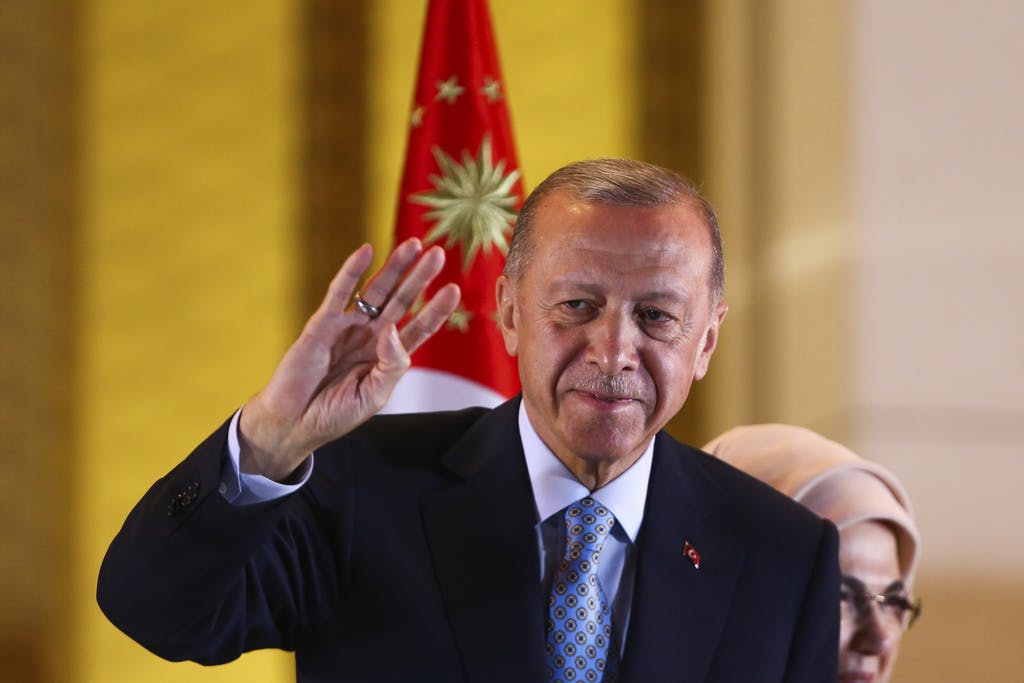EU’s Botched Response to Turkish Aggression in Cyprus Bodes Ill for Ukraine
As President Erdogan criticizes peacekeepers for doing their UN-mandated work in an EU member state, Brussels does … nothing.

The meek response from the EU’s chief, Ursula von der Leyen, to the inflammatory statements from Ankara over the incident in the buffer zone between Cyprus and the Turkish republic in northern Cyprus spells trouble not just for beleaguered Cyprus but for embattled Ukraine.
What exactly did Mr. Erdogan have to say? As the Sun has reported, several Turkish Cypriots last week descended on a group of peacekeepers of the United Nations inside Cyprus’s buffer zone. The Turkish Cypriots physically attacked the UN force as they tried to stop illegal roadworks at the mixed Turkish and Greek Cypriot village of Pyla from taking place.
It is the peacekeepers’ mandate to maintain the status quo in the so-called dead zone that bisects the politically divided island. Yet Mr. Erdogan sees the UNFICYP as an affront to what he views as Turkey’s sovereign rights in the region, rights recognized by few if any countries save for Turkey.
At a cabinet meeting on Monday, Mr. Erdogan said that “the physical intervention of the United Nations Peacekeeping Force soldiers on the sovereign territory of the ‘Turkish Republic of Northern Cyprus’ last Friday cannot be accepted. Preventing the Turkish Cypriots living in Pyla from reaching their own land is neither legal nor humane.”
At Ankara, Mr. Erdogan said: “As we always stress, Turkey has no ambitions for anyone’s land, sovereignty, or oil. We are a nation without the stigma of colonialism in its thousands of years of history.” Yet Turkey already occupies a third of Cyprus, an EU member state. Significantly, Mr. Erdogan added that “as a guarantor country, it should be known that we will not consent to lawlessness on the island, especially in the dead zone.”
Turkey, along with Greece and Britain, are guarantor powers of Cyprus. For Mr. Erdogan to evoke that status indicates that he is doubling down, and that tensions are almost certain to flare up. The “lawlessness” he cited stems from the Turkish Cypriot, which is to say Turkish, violation of a fragile status quo on a heavily armed island republic of the European Union.
The EU commissioner, Ms. Von der Leyen, in response said about what one would expect from a political figure whom London’s Spectator once called a classic example of “failing upwards”: “I strongly condemn the attacks on UN Cyprus peacekeepers by Turkish Cypriot personnel. Threats and assaults on UN peacekeepers are unacceptable.”
That robust language rolled across her X feed on Friday. On Monday, the peripatetic Frau Von der Leyen turned up at Athens, as did Ukraine’s president, who was welcomed by Greece’s prime minister, Kyriakos Mitsotakis.
Mr. Mitsotakis told President Zelensky that Greece would never recognize Russia’s illegal annexation of Ukrainian territory, a position “that is identified with Greece’s timeless interests” because “our own country has faced from time to time manifestations of an ahistorical revisionism and an aggressive authoritarianism.”
By that he meant Cyprus, drawing a parallel to Russian belligerence in Ukraine and Turkey’s illegal occupation of the northern third of Cyprus: “Something similar is still bleeding in Cyprus,” Mr. Mitsotakis said.
Frau Von der Leyen, for her part, also wrote that “the EU calls on the Turkish Cypriot side to respect the UN mission’s mandate in the buffer zone and refrain from actions that escalate tensions.” Yet the verbiage coming from Ankara indicates that Mr. Erdogan’s feathers are not exactly ruffled by social media wrist-slaps from the Teutonic doyenne of Brussels.
The escalating tensions in Cyprus must be seen in the context of broader Turkish ambitions in the region. Ankara is watching warily as Washington expands its force posture in the Mediterranean with the construction of new bases on two Greek islands in the Aegean Sea.
Mr. Erdogan bears no “stigma of colonialism” and is unapologetic about the Ottoman Empire’s former domination of Greece and Cyprus. He already has a third of Cyprus under his control. Vladimir Putin is, to put it mildly, unapologetic about the former Russian Empire’s domination of present-day Ukraine.
Messrs. Erdogan and Putin will meet in Turkey as soon as the end of this month, the Turkish newspaper Hürriyet reports. Top of the agenda will be bringing the Black Sea grain deal back to life, but the two leaders have more in common than affinity for wheat. Turkey’s self–professed role as a mediator in the Russo-Ukrainian war, to judge by the results, has mostly been performative.
In the meantime, the new president of Cyprus, Nikos Christodoulides, has pivoted toward the EU instead of Washington as a source for repairing Cyprus’s political divisions, even as Turkey throws salt on the wounds. Churning out condemnations on social media, though, reflects only the EU’s lack of the necessary institutional machinery to keeping Mr. Ergogan’s ire, and for the moment mostly inchoate territorial ambitions, in check.
________
This dispatch has been revised from the bulldog edition.

